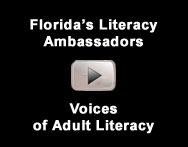|
A Framework for Utilizing Long-Term Volunteers
Josh Gahr, Texas A&M Education and Human Development
This article aims to elucidate those benefits and provide a framework for hosting a long-term volunteer or intern in a literacy center.
Top 7 Tips for Designing Your Nonprofit Logo
All
About Marketing
Carter McNamara, MBA, PhD
This article includes sections on Basics
and Planning, Market Analysis and Positioning, Protecting Ownership
of Your Products/Services, Evaluating Your Marketing Efforts and
more.
Behavior
and Beliefs of Volunteer Literacy Tutors
Catherine Hambly, MA
This paper examines the behaviors and beliefs of a group of volunteer
tutors to discover why they did not maintain close contact with
their literacy organization. After describing the tutors' behavior
in the matches with learners, the study draws a link from an apparent
contradiction–that tutors desire to help their learners
but are complacent about their learners' progress–to a belief
system shared by these tutors.
Outreach
and Retention in Adult ESL Literacy Programs
Shirley Brod
This digest discusses outreach methods; it examines learners'
reasons for enrolling in ESL classes and for leaving the classes;
and it suggests ways to improve retention.
Adult Students: Recruitment and Retention
Michael E. Wonacott
This Brief reviews recent research related to adult student recruitment
and retention and provides guidelines for recruiting and retaining
adult learners.
3 Ways to Recruit for Your Nonprofit
This article explains different volunteer recruitment methods, including writing a compelling recruitment message and how to recruit volunteers online.
"I've Come a Long Way": Learner-Identified Outcomes of Participation in Adult Literacy Programs
Mary Beth Bingman; Olga Ebert
A study explored how 10 Tennessee adult literacy students define the meaning and outcomes of their participation in adult education programs in the context of their lives. The primary source of data was the extended recorded conversations about participants' lives before and after enrollment in adult literacy programs.
Market Research White Paper on Student Recruitment in Adult Education
If you build it, they will come. Think again. Nationally, adult education and literacy providers are only serving 10% of the population in need. So how can we do better? FLC conducted a series of focus groups in which we explored messages, terminology, and communication methods that may be more or less effective in recruiting new students. We also discussed the motivations, concerns, and assumptions that factored into student decision making, and solicited their advice on how to effectively reach others.
Market Research White Paper on Recruiting English Language Learners
In an effort to gain some insights into how to reach and connect with adult English learners, FLC conducted a series of focus groups to explore key messages, terminology, and communication methods that may be more or less effective in recruiting students for ESOL pgorams. This is phase two of FLC's Market Research Project.
Educate & Elevate Webinars
This webinar series aims to equip adult literacy program directors with communication tools to elevate their organizations and build relevancy in the mission of adult education.
Basic Definitions: Advertising, Media, Promotion, Public Relations,
Publicity, and Sales
Advertising, marketing, promotion, public
relations and publicity and sales are often used interchangeably.
However, they refer to different -- but similar activities. Some
basic definitions are provided as well as a short example.
Media
P& R Toolbox
From the Library Media P & R, download
these free promotional materials.
Program
Quality Indicator Area: Recruitment
Recruitment to literacy programs is facilitated
by using a combination of strategies. This activity engages learners
in identifying strategies they believe will effectively recruit
students to their programs.
Recruitment
Issues and Strategies for Adults Who Are Not Currently Participating
in Literacy and Adult Basic Education (ABE) Programs
This study shows how initiating interventions
using students as a recruitment element is not only efficient
and cost effective; it also lends itself to an action research
method of future interventions and continuous tracking.
| Sign up to be notified of page updates. |
|
Please note: Change notifications will be emailed from
ChangeDetection.com instead of Florida Literacy Coalition. |
|












